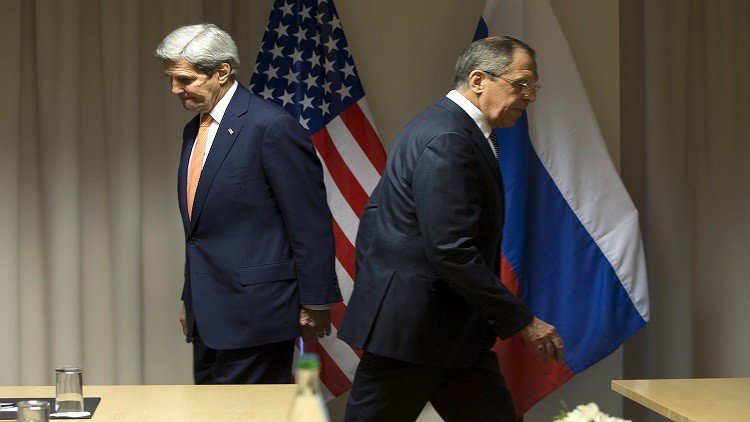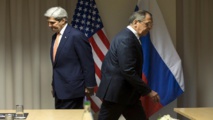Kerry jetted in to Geneva for talks with Arab ministers and UN peace envoy Staffan de Mistura, but US officials admitted privately that much depends on Russia's stance.
"We are talking directly to the Russians, even now," Kerry said, after a week in which Moscow conspicuously refused to rein it its ally, Syrian strongman Bashar al-Assad.
"The hope is we can make some progress," he said ahead of a meeting with Jordanian Foreign Minister Nasser Judeh in his Geneva hotel, on the eve of talks with De Mistura.
"But the UN Security Council Resolution calls for a full country, countrywide, cessation and also for all of the country to be accessible to humanitarian assistance."
Concern has been growing that the fighting will lead to the complete collapse of a landmark ceasefire between Assad's regime and non-jihadist rebels agreed in late February.
On Saturday, Russia said it would not urge Assad's forces to halt air raids on the war-ravaged city as they were targeting jihadist groups not covered by the truce.
Washington has rejected this argument and on Sunday the head of Moscow's coordination centre in Syria said talks on a freeze had begun.
"Currently active negotiations are underway to establish a 'regime of silence' in Aleppo province," Lieutenant General Sergei Kuralenko told Russian news agencies.
He said that a freeze in fighting in eastern Ghouta, a suburb of Damascus, had been extended to the end of Sunday and that another freeze was holding in Latakia province.
- More than 250 civilians dead -
"We are calling on all sides interested in establishing peace in Syria to support the Russian-American initiative and not to allow a regime of silence to be disrupted," Kuralenko said from Russia's Hmeimim air base in Syria.
Before leaving Riyadh for Geneva to join Kerry and De Misura, Saudi Foreign Minister Adel al-Jubeir accused the Assad regime of committing "war crimes" in Aleppo.
Before leaving Washington, Kerry expressed "deep concern" about Aleppo, which has suffered some of the worst fighting in a war that has killed more than 270,000 people.
At least 253 civilians -- including 49 children -- have been killed on both sides of the divided city since April 22, the Syrian Observatory for Human Rights monitor says.
On Sunday the provincial capital's rebel-held east was eerily quiet, an AFP correspondent said.
There were no reports of fighting in the regime-controlled west of the city, the Observatory said.
But air strikes did hit several rebel areas on Aleppo's northwestern outskirts, after rebel shelling of the west and regime bombing north of the city in the night.
Rockets were fired Sunday from rebel-held areas into the west without causing casualties, it said.
The regime dropped barrel bombs on Castello road, the only route in and out of rebel-held parts of Aleppo and a civilian escape route, the Observatory said.
- #AleppoIsBurning -
The fighting has dampened hopes that the ceasefire could finally lay the groundwork for an end to Syria's five-year conflict.
Peace talks last month in Geneva failed to make any headway, though De Mistura has said he hopes they can resume "during the course of May".
Concern for Aleppo, Syria's former economic hub, has been growing.
A hashtag demanding an end to the violence -- #AleppoIsBurning -- has spread on social media, with protests planned this week around the world.
In neighbouring Lebanon, dozens of demonstrators protested, some wearing white helmets marked "Civil Defence" in a nod to Aleppo's rescue workers.
Lebanon currently hosts more than a million Syrian refugees.
The escalating violence in Aleppo has also struck medical centres, with the International Committee of the Red Cross reporting four hit Friday on both sides.
And a raid on Wednesday hit a hospital supported by Doctors Without Borders and the Red Cross, killing 30 people and sparking an international outcry.
On Saturday, many terrified residents fled a new wave of air strikes on the city's east, saying the violence had become unbearable.
Syria's conflict erupted in 2011 after the brutal repression of anti-government protests and has since escalated into a complex, multi-faceted war.
----------------------------------------------------------------------------------------------------------------
"We are talking directly to the Russians, even now," Kerry said, after a week in which Moscow conspicuously refused to rein it its ally, Syrian strongman Bashar al-Assad.
"The hope is we can make some progress," he said ahead of a meeting with Jordanian Foreign Minister Nasser Judeh in his Geneva hotel, on the eve of talks with De Mistura.
"But the UN Security Council Resolution calls for a full country, countrywide, cessation and also for all of the country to be accessible to humanitarian assistance."
Concern has been growing that the fighting will lead to the complete collapse of a landmark ceasefire between Assad's regime and non-jihadist rebels agreed in late February.
On Saturday, Russia said it would not urge Assad's forces to halt air raids on the war-ravaged city as they were targeting jihadist groups not covered by the truce.
Washington has rejected this argument and on Sunday the head of Moscow's coordination centre in Syria said talks on a freeze had begun.
"Currently active negotiations are underway to establish a 'regime of silence' in Aleppo province," Lieutenant General Sergei Kuralenko told Russian news agencies.
He said that a freeze in fighting in eastern Ghouta, a suburb of Damascus, had been extended to the end of Sunday and that another freeze was holding in Latakia province.
- More than 250 civilians dead -
"We are calling on all sides interested in establishing peace in Syria to support the Russian-American initiative and not to allow a regime of silence to be disrupted," Kuralenko said from Russia's Hmeimim air base in Syria.
Before leaving Riyadh for Geneva to join Kerry and De Misura, Saudi Foreign Minister Adel al-Jubeir accused the Assad regime of committing "war crimes" in Aleppo.
Before leaving Washington, Kerry expressed "deep concern" about Aleppo, which has suffered some of the worst fighting in a war that has killed more than 270,000 people.
At least 253 civilians -- including 49 children -- have been killed on both sides of the divided city since April 22, the Syrian Observatory for Human Rights monitor says.
On Sunday the provincial capital's rebel-held east was eerily quiet, an AFP correspondent said.
There were no reports of fighting in the regime-controlled west of the city, the Observatory said.
But air strikes did hit several rebel areas on Aleppo's northwestern outskirts, after rebel shelling of the west and regime bombing north of the city in the night.
Rockets were fired Sunday from rebel-held areas into the west without causing casualties, it said.
The regime dropped barrel bombs on Castello road, the only route in and out of rebel-held parts of Aleppo and a civilian escape route, the Observatory said.
- #AleppoIsBurning -
The fighting has dampened hopes that the ceasefire could finally lay the groundwork for an end to Syria's five-year conflict.
Peace talks last month in Geneva failed to make any headway, though De Mistura has said he hopes they can resume "during the course of May".
Concern for Aleppo, Syria's former economic hub, has been growing.
A hashtag demanding an end to the violence -- #AleppoIsBurning -- has spread on social media, with protests planned this week around the world.
In neighbouring Lebanon, dozens of demonstrators protested, some wearing white helmets marked "Civil Defence" in a nod to Aleppo's rescue workers.
Lebanon currently hosts more than a million Syrian refugees.
The escalating violence in Aleppo has also struck medical centres, with the International Committee of the Red Cross reporting four hit Friday on both sides.
And a raid on Wednesday hit a hospital supported by Doctors Without Borders and the Red Cross, killing 30 people and sparking an international outcry.
On Saturday, many terrified residents fled a new wave of air strikes on the city's east, saying the violence had become unbearable.
Syria's conflict erupted in 2011 after the brutal repression of anti-government protests and has since escalated into a complex, multi-faceted war.
----------------------------------------------------------------------------------------------------------------









 Home
Home Politics
Politics











